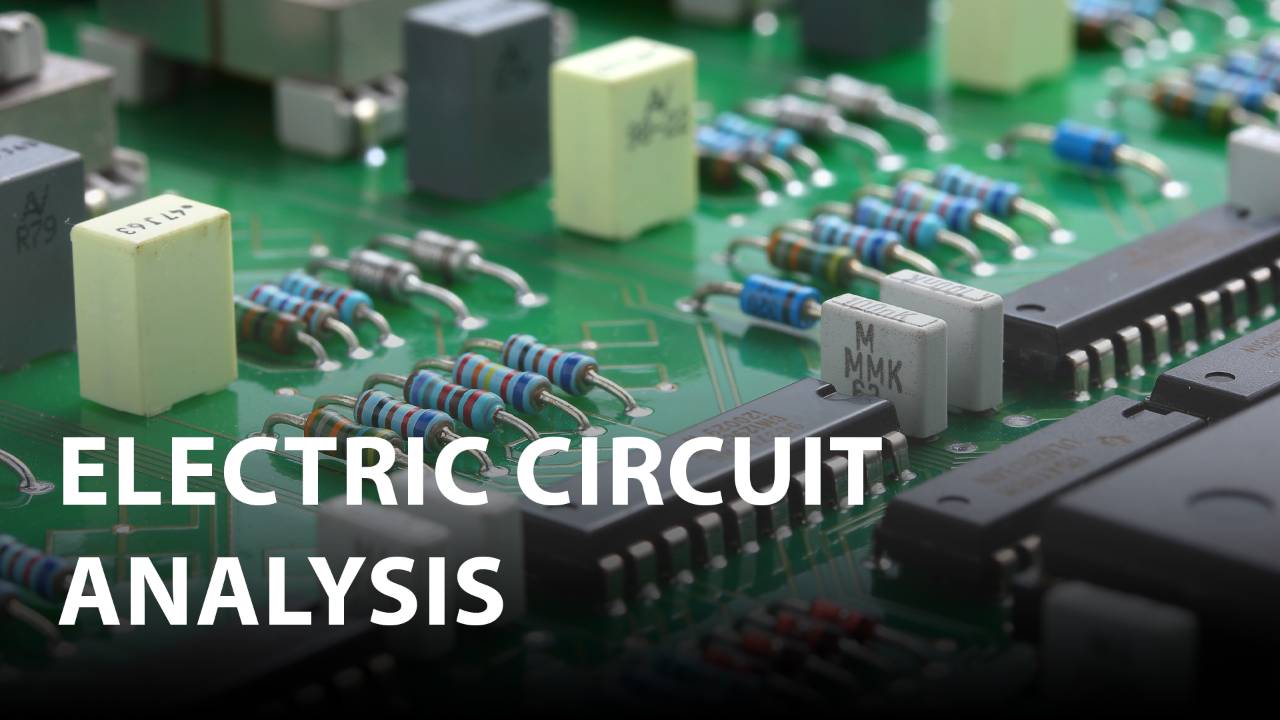Electric Circuit Analysis
10 sections | 66 lectures | 5hr 54min
Learn about DC and AC circuits and circuit analysis techniques with our Electric Circuit Analysis online course. Professional engineers can earn 6 PDHs by completing this course.
Access This Course
Course Description
This course is designed to provide a complete overview of electric circuit analysis used in electrical engineering and electronics engineering. Electric circuit analysis is the most fundamental concept for electrical engineering, electronics engineering, and computer engineering. It is for that reason that electric circuit analysis is usually the first course taught in electrical, electronics, and computer engineering programs at universities, as basically anything related to electrical, electronics, or computer engineering stems from electric circuit analysis.
In this course you will learn everything about electric circuits and electronics, from the basics such as what an electric circuit is and the fundamentals of electrical quantities like voltage, current, and power, all the way to complex techniques for analyzing electric and electronics circuits. The course is roughly divided into the following sections:
Course Introduction:
We will begin in section 1 by giving an introduction to the course, introducing the instructor, and defining the course objectives.
Fundamentals of Electric Circuits:
In sections 2 and 3 of the course, we will discuss what an electric circuit is at the most basic level, followed by explanations of electrical quantities and sources of electricity. This is the foundation for electrical engineering and electronics engineering.
Basic DC Electric Circuit Analysis:
In sections 4, 5, and 6 we will discuss the analysis of direct current (DC) circuits, starting from basic analysis techniques such as Kirchhoff's voltage law and Kirchhoff's current law (KVL and KCL), voltage division, current division, nodal analysis, and loop analysis. We will also be discussing how complex resistive circuits can be simplified into equivalent circuits for easier analysis of electric circuits and electronics.
Advanced DC Electric Circuit Analysis:
In section 7, we will discuss advanced analysis techniques for electric circuits and electronics such as the superposition theorem, Thevenin's theorem, and Norton's theorem.
Energy-Storing Devices in Electric Circuits:
In sections 8, and 9, we will discuss passive components in circuits that are able to store energy: capacitors and inductors. We will cover the fundamentals of capacitors and inductors, how they store energy, and how to simplify complex circuits containing combinations of capacitors and inductors into simpler circuits for easier analysis of electric circuits and electronics.
Transients in Electric Circuits:
In section 10, we will discuss the analysis of first-order electric circuits during transients. This is where things start getting a bit more advanced, but we will solve several examples to illustrate how circuits behave during transients, as opposed to the steady-state circuits previously discussed.
In each section, several examples are solved to illustrate how to analyze practical circuits.
By learning all the fundamentals about electric circuit analysis and electronics, you will be able to continue studying other topics in electrical engineering, electronics engineering, and computer engineering, such as analog electronics, digital electronics, circuit design, electric machines, power systems, and more.
See you in the course!
What You'll Learn
Access This Course
Preview Lectures
Check out the three lectures below from this course!
Pricing Options
Choose one of the following: monthly all-access, annual all-access, or a one-time purchase of this course only. All-access subscriptions include every course, future releases, and access to the Romero Engineering Co. Web App. All options are backed by a 30-day, 100% money-back guarantee.
Course Outline
Not sure if this course covers what you want to learn? Download the full course outline to find out more.
Download OutlineCourse Instructor
Ricardo Romero, PE is an Electrical Engineer with over twelve years of experience in Power Systems, having worked as a Power Systems Protection Engineer at Schweitzer Engineering Laboratories, Inc. (SEL) and Power Relaying Solutions, PLLC (PRS). He started his own power engineering consulting and online learning business in 2020 – the Romero Engineering Company. He obtained his bachelor’s and master’s degrees in Electrical Engineering from The University of North Carolina at Charlotte, where he specialized in Power Systems, Power Electronics, and Power System Protection and Control. He is a licensed Professional Engineer in Power Systems in the states of North Carolina, Pennsylvania, South Carolina, and Virginia.
Book a Call
Frequently Asked Questions
How many PDHs does this course offer?
How many lectures are included in the course?
What does my subscription give me?
Who is this course for?
Start Learning Today
If you're ready to start learning about electric circuit analysis, let's get started.
Learn About Power Engineering
Stay informed about new online courses, upcoming webinars, and promotions by signing up to our email list.

